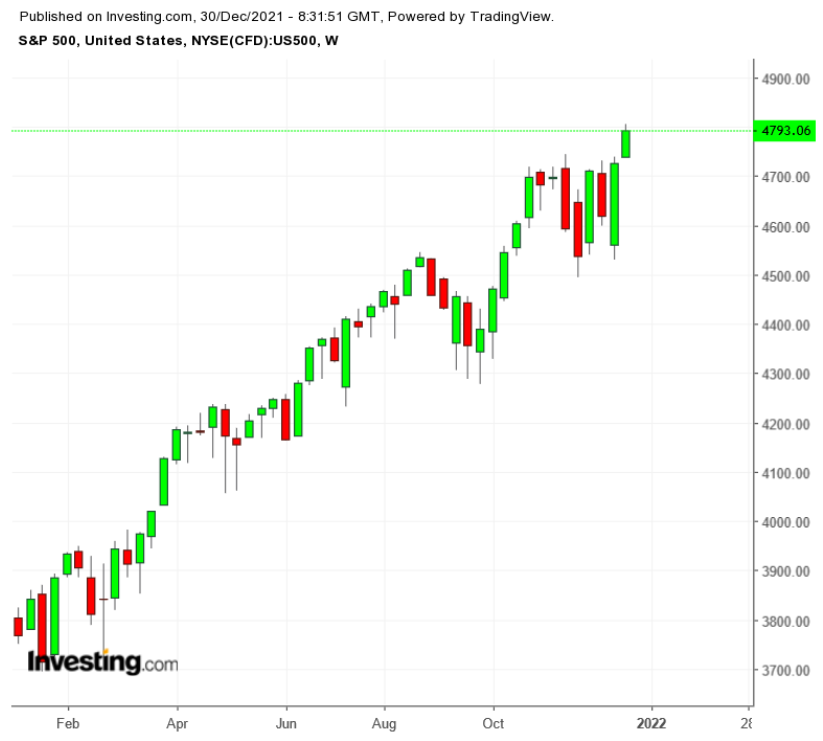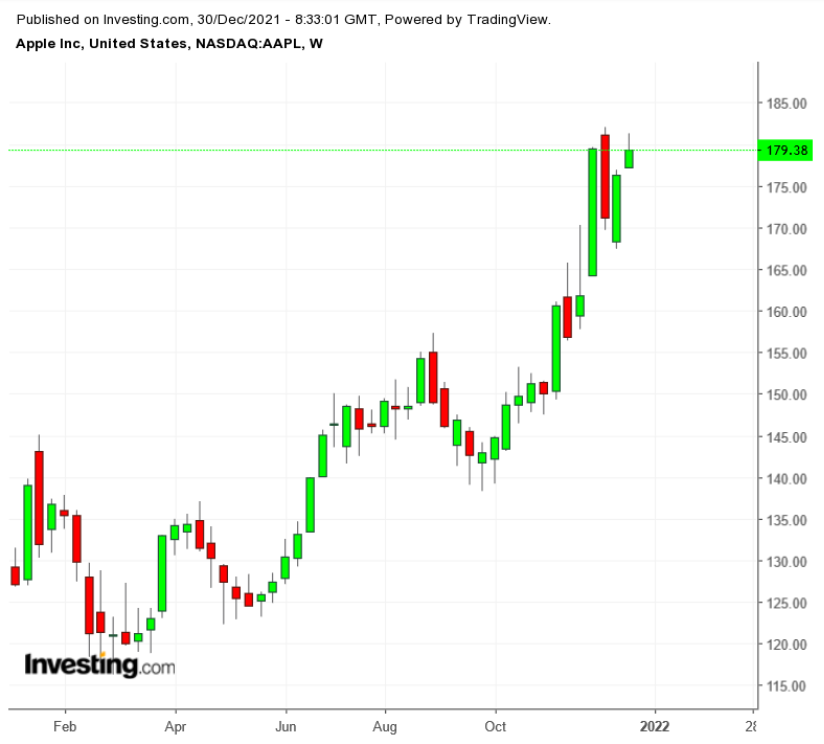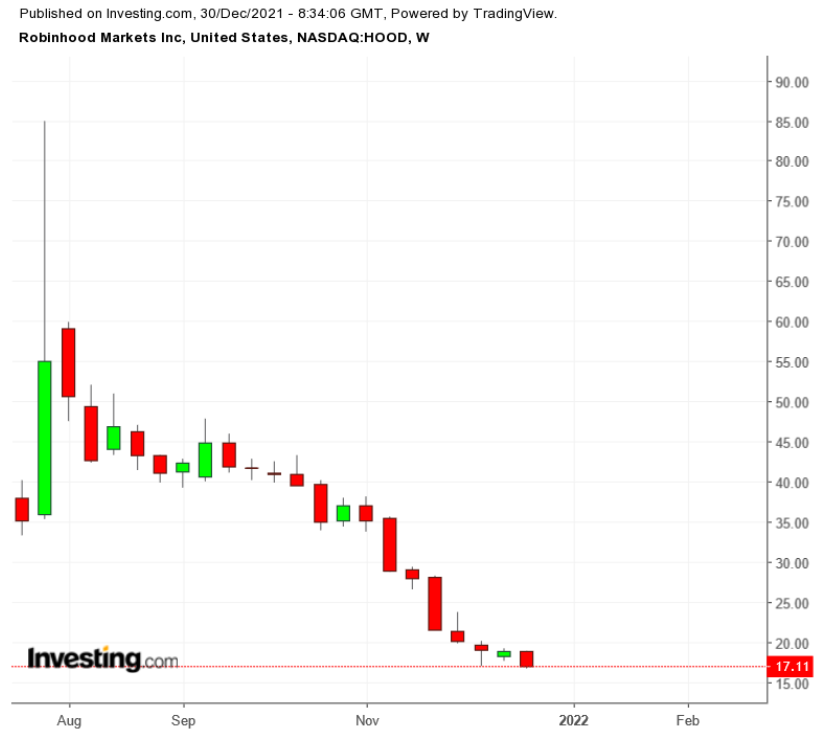Even with just two more trading days left, it's clear 2021 has been a good year for stocks. A really good year.
The Dow Jones Industrial Average pushed to new closing and 52-week highs on Wednesday and appeared poised to finish 2021 up nearly 20%.

The S&P 500 set new records this week and was flirting with a 28% return for the year, its best performance since 2019. As important, the broad-based index of large cap stocks appears set to outperform the tech-heavy NASDAQ Composite for the year, for the first time in five years.
The great finish raises questions for Wall Street and investors as traders get ready for 2022:
- How will markets react to the probability of higher interest rates and more inflation?
- How will consumers and economies around the world react to the uncertainty of new waves of COVID-19?
- How will markets cope with the probability of rising tensions in Ukraine and Taiwan and an increasingly poisonous US political environment?
We can only guess at the answers right now, but we do know what pushed the markets higher in 2021. Catalysts included:
- The Federal Reserve's policy of keeping interest rates low while the US economy got over the shock of the COVID-19 pandemic.
- The belief/hope in the spring and summer that the worst of COVID was over. The result created easing of COVID-related restrictions, a rebounding jobs market, robust retail sales and booming housing construction.
- Rising oil and natural gas prices that caused oil and gas companies to start drilling again. Crude finished Wednesday at $76.56, up about 58% this year. Bullish analysts believe crude could move higher in 2022, topping $100 a barrel. Light sweet crude has not traded above $100 a barrel since July 2014.
But investor and trader optimism seemed to fade in November and early December as inflationary pressures became too great for the Fed to ignore.
Gasoline prices are up 45% this year after a 14% increase in 2020. The US Consumer Price Index for November showed the price of food at home up 6.4% over the last year. Used-car prices are up 31%. Electricity costs were up 6.5% from a year earlier.
Thank Heaven For The Holiday Rally
The fade began after the October nonfarm payrolls report came out on Nov. 5. Stocks peaked on Nov. 8 and started to head lower the next day, sliding until Dec. 21 when a classic end-of-year market rally erupted.
But it has been a conservative rally, with many investors searching out mega cap stocks that worked, especially Apple (NASDAQ:AAPL), which rose 7.1% between a Dec. 20 low and Wednesday.

Apple has also come close to topping $182.80 per share, which analysts believe would give the company the first $3 trillion market cap in history. On Wednesday, at the close, its market cap valuation was $2.94 trillion.
The shares are up 35% for the year, including 8.5% in December alone.
The Role Of The Dollar
If investors weren't looking for very large cap stocks that seemed safe, they appeared happy to buy bonds. The 10-year Treasury yield hit 1.546% on Wednesday, up 4.2% from Tuesday but little changed from the levels at which it was trading ahead of the Fed's Dec. 15 announcement when the central bank said it was looking at raising interest rates next year, probably two or three times.
Some bond buying may be global investors looking for safety. Some economies, especially Turkey, are struggling badly.
Plus, currency traders may want to own dollars now because they see rates rising. Maybe not now, but not too far in the future, according to Matthew Weller.
A worrisome signal during the November-December market stress was the precipitous decline in the ratio of new 52-week highs compared with new 52-week lows. The ratio was as high as 822 in early March and as low as negative 660 on Dec. 3. There were just two days in December where the ratio was positive.
Energy Stocks Rule
While the Fed set the table, energy stocks have been 2021's 'main course' as a sector in the S&P 500 by far, led by Devon Energy (NYSE:DVN), Marathon Oil (NYSE:MRO), and Diamondback Energy (NASDAQ:FANG), up 180%, 148%, and 125%, respectively, for the year.
The other top sectors were:
- Real estate and home construction, led by Extra Space Storage (NYSE:EXR), up 95%, Simon Property Group (NYSE:SPG), up 86%, and Mid-America Apartment Communities Inc (NYSE:MAA), up 80%.
- Technology, led by cybersecurity developer Fortinet (NASDAQ:FTNT), up 147% as of Wednesday.
- Financials, led by SIVB Financial Group (NASDAQ:SIVB), up 76%, Wells Fargo (NYSE:WFC), up 61%, and Charles Schwab (NYSE:SCHW), up 60%.
The top five Dow stocks so far in 2021 are:
- Home Depot (NYSE:HD), up 55%
- Microsoft (NASDAQ:MSFT), up 54%
- Goldman Sachs (NYSE:GS), up 46%
- UnitedHealth (NYSE:UNH), up 44%
- Cisco Systems (NASDAQ:CSCO), up 43% (N.B. Cisco is the top Dow performer for December, up 16%)
Among NASDAQ 100 stocks, the top 2021 performers were:
- Fortinet (NASDAQ:FTNT), up 147%
- Moderna (NASDAQ:MRNA), up 137%
- NVIDIA (NASDAQ:NVDA), up 130%
- Applied Materials (NASDAQ:AMAT), up 86%
- Marvell (NASDAQ:MRVL), up 86%
For all the big wins, however, there are issues below the market's radar that bear watching.
The IPO Problem
More than 1,000 companies went public in 2021, raising more than $300 billion.
The companies that IPO'd won lots of headlines when their stock prices shot up on the first day of trading. But there was a downside: two-thirds of those stocks are now trading below their offering prices.
The Renaissance IPO ETF (NYSE:IPO) is down 11% on the year.
A few examples:
Robinhood Markets (NASDAQ:HOOD), whose trading platform lets retail investors trade commission-free, went public at $38 on July 29.

The shares hit $85 a few days later but have fallen to $17.11. That's an 80% decline off the post-IPO peak and 55% from the IPO price.
Swedish oat-milk producer Oatly (NASDAQ:OTLY), which counts Oprah Winfrey, actor Natalie Portman, and former Starbucks (NASDAQ:SBUX) CEO Howard Schultz as investors, raised $1.4 billion going public at $17 in mid-May. The stock jumped to $29 in June and is now at $7.88, off 54% from its IPO price.
Rivian (NASDAQ:RIVN), the electric vehicle maker, went public at $78 on Nov. 10. It's up 27% overall, but has fallen by 17% in December. Part of the issue for RIVN is that the company has delayed deliveries of its pickup truck and an SUV with a big battery pack until 2023. That shaved more than 3% from the stock price just on Wednesday.
Pandemic Winners That Eventually Sagged
Other companies that initially benefitted from the pandemic have experienced slumping stock prices.
COVID-vaccine maker Moderna, despite its gaudy performance among NASDAQ 100 stocks, is off 50% from its 52-week high in August, in large part because the Food and Drug Administration recently authorized use of coronavirus pills made by Pfizer (NYSE:PFE) and Merck (NYSE:MRK).
Exercise-equipment maker Peloton (NASDAQ:PTON) was a huge winner after the initial COVID eruption, as shares soared 434% in 2020. However, they're down 76.8% this year.
And, if you're not looking you might miss movie-theater operator AMC Entertainment Holdings (NYSE:AMC), which saw its shares jump more than 3,300% between the end of 2020 and June 2. The shares have since fallen about 62%.
Even Bitcoin is vulnerable. The best known cryptocurrency, which behaves more like a speculative asset than a currency, is up 63% on the year, but it is also off nearly 32% from its Nov. 10 peak.
5 Things We Would Like To Believe Could Happen Next Year
Finally, we'll hazard five assumptions about 2022.
- First, the Omicron COVID variant won't prove as deadly as the Delta variant, and, slowly but surely, more people will get vaccinated and learn to live with their masks and get regular booster shots.
- Second, some inflationary pressures, particularly from energy prices, will ease.
- Third, the underlying US economy will pull people back to work at higher pay and, one hopes, with decent benefits.
- Global tensions—in Ukraine, Taiwan and Iran—will moderate.
- The mid-term elections will be civilized.
If these conditions apply, the US economy should continue to grow reasonably strongly next year. The Fed's interest-rate increases will likely be measured. Right now, no one has the stomach to crush inflation as the late Fed Chairman Paul Volcker did in the early 1980s.
